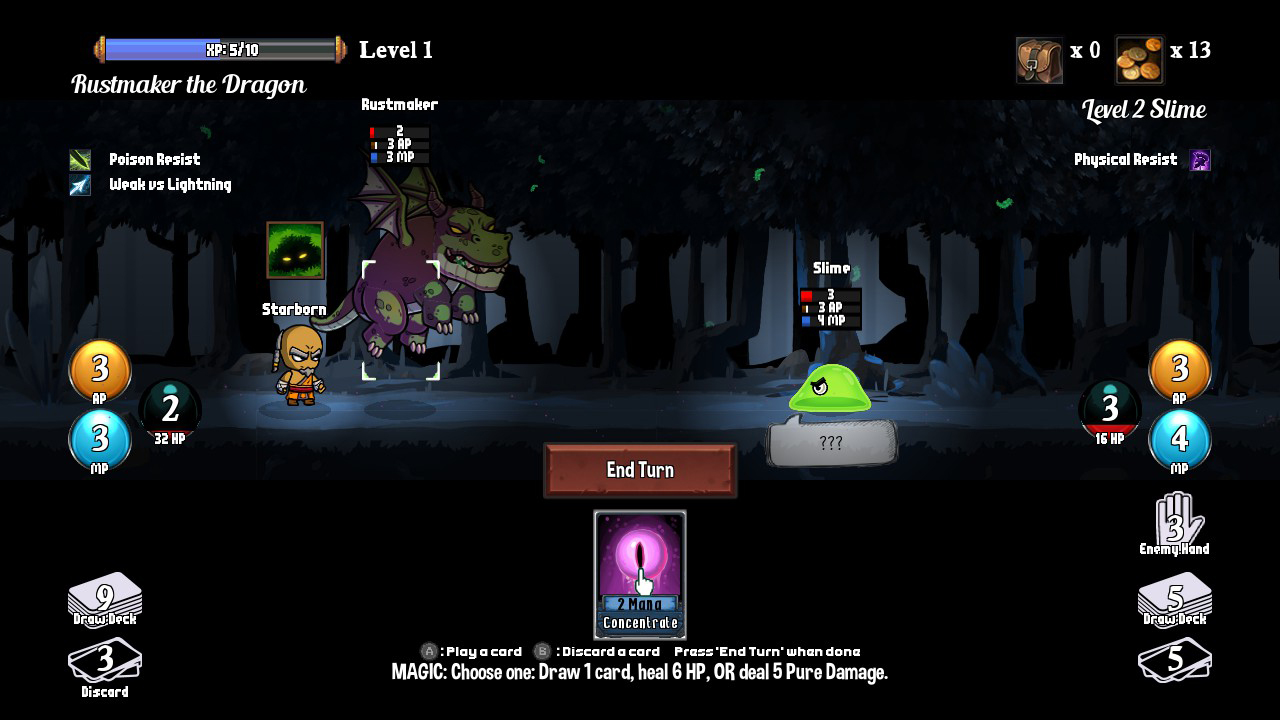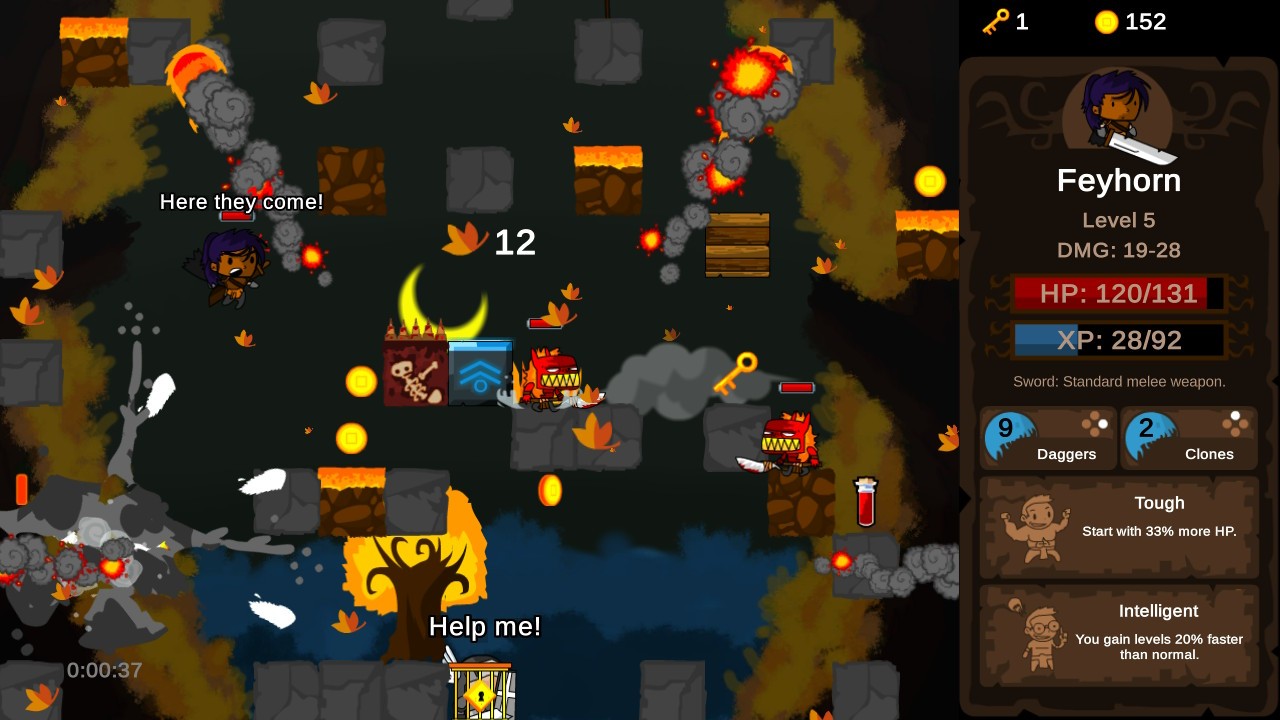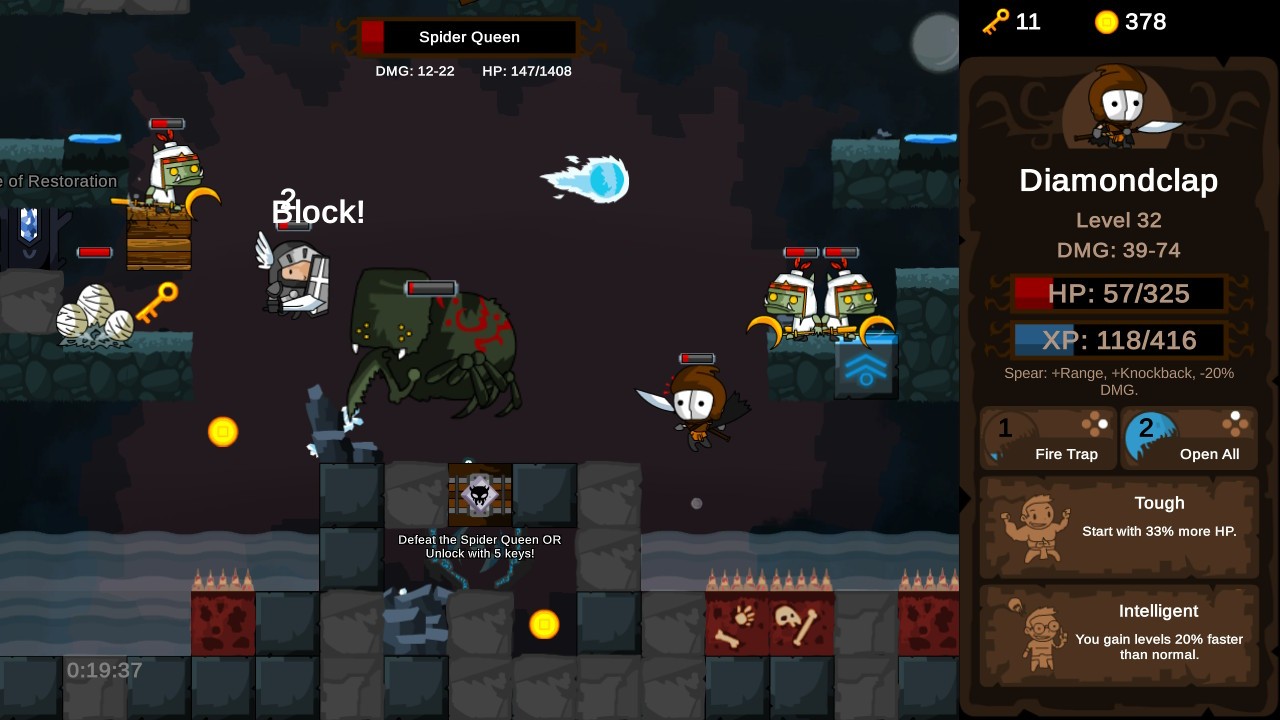 In all honesty, the idea of game bundles on the Switch excites me. Due to the fact that Nintendo seems to actively hate and despise people calling for order on the Switch, there still isn’t any way to make folders or even real custom organization on the home screen, and I hope these sentences don’t age well (like, within a week or so). Also, we’re now three years out: three glorious years of Switchdom, and the open doors of the eShop have attracted so many goddamn games that my Switch library rivals my Steam library, though I need Humble Bundle to offer a Switch deal before I can truly start to say that. As a result, there are titles that exist that I enjoy and can’t find, or titles that I delete because it’s just arduous to trudge through the whole scroll in order to find a single indie game. Digerati, which has published quite a few smaller indie titles, is now bundling multiples together, and the one I hold in my hands, the Nerdook Bundle Vol. 1, is a pretty great package to analyze for the first foray into their bundling realms.
In all honesty, the idea of game bundles on the Switch excites me. Due to the fact that Nintendo seems to actively hate and despise people calling for order on the Switch, there still isn’t any way to make folders or even real custom organization on the home screen, and I hope these sentences don’t age well (like, within a week or so). Also, we’re now three years out: three glorious years of Switchdom, and the open doors of the eShop have attracted so many goddamn games that my Switch library rivals my Steam library, though I need Humble Bundle to offer a Switch deal before I can truly start to say that. As a result, there are titles that exist that I enjoy and can’t find, or titles that I delete because it’s just arduous to trudge through the whole scroll in order to find a single indie game. Digerati, which has published quite a few smaller indie titles, is now bundling multiples together, and the one I hold in my hands, the Nerdook Bundle Vol. 1, is a pretty great package to analyze for the first foray into their bundling realms.
Nerdook, for those unaware, is a single person development team who has been putting out complex, addictive but still accessible games for the better part of several years. This bundle contains three of the arguably best games from the studio: Monster Slayer, Reverse Crawl and Vertical Drop Heroes. You have zero fanfare or delay before choosing one of these games: the instant the software loads, you have a simple selection screen that lets you toggle and decide what’ll be your game of choice for the day. Now, keep in mind, this simple bundle approach has a double edged feel to it. On the one hand, great, you can pick a game and jump in with zero preamble, and most of the splash screens prior to the games are fairly short and easy to skip. On the other hand, due to the lack of cohesion, you need to end the software completely if you want to go back and choose another game. Unlike the pinball table bundles or any of the Psikyo bundles, the games live independently from one other, sharing one roof but a lot of very separate walls to keep themselves sequestered. Just keep that in mind before loading up the titles.
The least exciting title of them all is Reverse Crawl, which is a shame because it’s got the most cohesive plot line. You play a princess who was super into necromancy, and your hobby came in handy when invaders swarmed your father’s castle and murdered him on the throne. You bring daddy back to life, and you and he decide to use your talents to summon up an army and fight your way out to find those who have upset your kingdom and make them pay. What comes next is a turn based combat wave strategy game, wherein you have to use a combination of combat tactics, selective troop coordination and intervening spells to keep up the assault and turn the tide of victory. As you move forward, the princess becomes stronger, summoning more and more varieties of helper troops, and you level up your skills and all that jazz. Continue onward until everything is slain and you’re the ruler of the realm again, undead or otherwise.
The combat and actual gameplay of Reverse Crawl is perfectly fine. Learning through playing, you get the feel of different advantages that skeletal soldiers have between using ranged or melee attacks, when your princess can drop the heal spell or just summon an additional troop to absorb firepower, and when to swap out troops and put in another unit. With a grid based system, players familiar with most strategic combat games will find this fairly easy to pick up and grasp, like a very simplified, 2D version of Mutant Year Zero. If at all possible, be sure to play the game in handheld mode: the cursor to highlight areas doesn’t show up as well as I’d like on the big screen, and being able to use some of the latent touchscreen options can speed things along. I suppose that’s something that should be mentioned: none of these games are exactly new, and they’ve all existed on other platforms before, so there’s a ton of literature and even videos to watch if you get stuck or don’t understand some aspect of the games. Nerdook is a fan of players delving deeper into their titles, so you can find plenty of opinions, positive and negative, about how things play out.
My biggest gripe with Reverse Crawl is that it all feels a tad flat and honestly unbalanced. Unlike the other two titles in the bundle, which rely a lot on roguelike generatings and replay through luck of the draw, Reverse Crawl seems more linear and clean cut as to what needs to happen. If you’re having a bad time with a wave of monsters, tough luck: you might need to start from the beginning entirely, or maybe just close the game, take a moment to regroup, and try again. There wasn’t a hook to keep me going in the face of adversity, there wasn’t the thought that my defeat here could translate into something better with future runs or iterations. Also, a lot of the troops were wildly unbalanced in terms of damage and defense: even the first skeletons you have hit like a truck but can get knocked over by a strong gust of wind. In the end, I genuinely didn’t enjoy it as much as I hoped I would, and I doubt I’ll be coming back to try it again anytime soon.
By stark contrast, Monster Slayers, which is also the newest title from Nerdook, was fascinating and compelling in a way that I hoped for and was rewarded with. Built against a simple plot line that manages to have a fantastic reach, Monster Slayers is about a world that’s overpopulated with monsters and the call for a hero to come and beat back the darkness is well known. Interestingly, the legend doesn’t choose to name specifically who will be the savior, but every wannabe hero worth their weight thinks they’re the fabled “one” to get the job done. This factors well into the game’s randomly generated heroes and settings, because, after all, only one of us can be “the one,” and you don’t need to be let down if the character the game generated turns out to be a flop. They just weren’t the legendary hero, no worries, move on. In fact, the game even gives you the option to reroll the heroes that are generated to choose from (for the cost of a couple of coins) because, well, some people are especially not the hero and just think and hope they might be, but we can send them away without burning their lives into ash.
Monster Slayers plays out as a deck-building adventure game in which you use cards that you find to attack, defend, refill your mana or HP and try to defeat monsters that you encounter that have similar equipment. Through the process of the quest, you’ll have opportunities to invest in gold (which can help out for your current hero and future heroes), pick up cards you find in the dungeon (which may or MAY NOT help you with this run) and level up, unlocking new spells and abilities. This last part is especially crucial because that’s where the new heroes factor makes the biggest impact. Statistically, the first hero you get has almost no hope of getting all the way through the multiple settings and dungeons to the final arena, even if you’ve got amazing luck on your side. However, through strategic investments in a singular character class, you might have some success with the next generation of barbarian or rogue, and, if you’re like me and you want to choose dragon, you need to play the long game here for certain. The dragon class especially had some amazing spells, but it took quite a bit of levelling and humble defeats to learn that you need to build up to those spells: you can’t cast a damn thing with one mana in the pool.
Honestly, Monster Slayers is probably the best game in the pack for someone coming fresh into the Nerdook game world and it has the most replay value from an outside perspective. I mean, there are a good number of cards and various allies to pick up and make the game more interesting and eclectic. The map is VAST, and you can really choose the way you move forward and add more and more to the potential heroes as time moves on. Even though it’s card based and themed around deck building, the ideas are very clean cut and simple to follow. Compared to something like the Lord of the Rings card game, Monster Slayers can be comprehended in about two turns worth of monster slaying, but the game allows for about four stages of tutorial before the story mode really kicks in. You can grow attached to heroes and enjoy their runs, but there’s enough of a nonentity presence that keeps you from growing attached or bummed out if a run fails. You grow and get stronger constantly, and the journey is very satisfying. Hell, I would probably even recommend getting this on it’s own…if it weren’t for the last game.
Vertical Drop Heroes is probably the best known of Nerdook’s, and it’s my favorite because it scratches all the itches I need instantly. Procedurally generated heroes, dungeons, loot and bosses? Check. A chance for the game to instantly kill you in three seconds or reward you wildly and totally unfairly? Check. Action that just gets more and more intense the more often you run? Super check. Vertical Drop Heroes is like a quick and dirty version of Towerfall that I prefer simply because it is so gritty and chaotic. You choose a hero, get literally dropped into a stage, and fight your way down until you get beat to a pulp, at which point maybe some of the gold you found will be carried over to the next hero. If you haven’t noticed yet, Nerdook does a great job of creating single serving heroes with minimal concern about what happens to them, but it works out especially well in Vertical Drop Heroes where you can get swarmed and overwhelmed by enemies without a single moment’s hesitation. It reminds me of the great roguelites that have filled up my smartphone and my computer, and then it’s just better because it’s on the Switch.
You gather up all this loot, sometimes running random mini quests in the middle of your main quest without any idea how to do them (get three roses, kill a crow, etc). You can end up teleporting back to the top of the stage and dropping down again, this time knowing where things are and aren’t, but also risking getting slain by random spikes and traps that maybe you missed the first time. You invest that gold into making your attack stronger, your Mega Jump even better, unlocking new skills and new random things that could be a factor for future heroes. What’s brilliant is all these things start to unlock instantly and keep coming run after run after run. It’s not overwhelming because the game paces to your own power, and it’s simple as dirt to drop the game and pick it up hours or weeks later and know exactly what you should keep doing. The skills are crazy but not OP because of limited mana, the enemies are constant but not unfair thanks to terrain, and it’s a whole package that’s addictive without being detrimental. You can quote me on it, Vertical Drop Heroes is the best way to waste time while feeling like you’re accomplishing something, and I’m tickled pink to have it on my Switch.
Nerdook Bundle Vol. 1 is a great set without being too expensive or too large of a swing. Two excellent titles, one decent title (that’ll probably appeal a lot more to people who aren’t me) and helping to promote both building the Switch library while giving a variety in gameplay with common elements. It’s actually really cool to have three vastly different games with a thread of familiarity to keep you going even if it feels off. Excited to see what other bundles Digerati might be bringing in the near future.
REVIEW CODE: A complimentary Nintendo Switch code was provided to Bonus Stage for this review. Please send all review code enquiries to press@4gn.co.uk.
Subscribe to our mailing list
Get the latest game reviews, news, features, and more straight to your inbox
Thank you for subscribing to Bonus Stage.
Something went wrong.
Nerdook Bundle Vol. 1 Review
-
Gameplay - 8/10
8/10
-
Graphics - 8/10
8/10
-
Sound - 8/10
8/10
-
Replay Value - 8/10
8/10
User Review
( votes)Overall
Summary
Three compelling and exciting indie titles in a clean and straightforward package.




